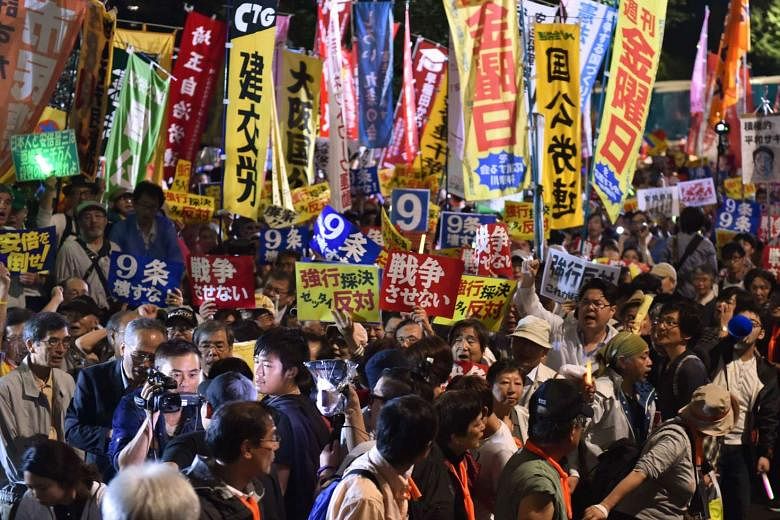TOKYO - In a major shift in Japan's security policy, the nation's Parliament in the early hours of Saturday enacted laws that enable its troops to fight overseas for the first time since World War II.
After holding more than 200 hours of deliberations in both chambers of the Diet, the Upper House plenary session passed a pair of government-sponsored Bills into law with the backing of Prime Minister Shinzo Abe's Liberal Democratic Party and its coalition partner, the Komeito party, as well as three minor opposition parties.
The final vote was 148 for and 90 against, according to President of the upper house Masaaki Yamazaki.
In last-ditch efforts to block the Bills' passage, opposition parties filed a series of censure and no-confidence motions against Mr Abe, his Cabinet and parliamentary leaders. Such delaying tactics significantly slowed the proceedings that led to the final vote only to fail, given the majority held by the LDP and Komeito in both houses of the Diet.
Outside the Diet building, thousands of people, including high school students and mothers with little children, rallied and chanted slogans such as "Scrap the bills", "No War" and "Abe, Quit".
"I think it was a problem that the ruling camp pushed ahead with the vote even though many people say the bills are unconstitutional", a 28-year-old female graduate student said, asking not be identified.
The kerfuffle over the legislation within and outside of Parliament showed the divisiveness of the new laws. Opinion polls show a majority of voters object to them.
While Mr Abe says the legislation will strengthen Japan's alliance with the United States for firmer deterrence in the Asia-Pacific region, opposition lawmakers argue it violates the war-renouncing Constitution and could drag Japan into US-led conflicts around the world.
Before the legislation, Japan's previous governments maintained a self-imposed ban on collective self-defence. But after the passing of the new laws, the nation's Self-Defence Forces can now defend the US or other friendly nations under armed attack when Japan faces "a situation that threatens to its survival".
However, this right to collective self-defence will be limited to cases such as contingencies on the Korean Peninsula, where North Korea poses a threat to the region, and in the East China Sea where Tokyo is embroiled in a dispute with Beijing over a group of uninhabited islets.
Mr Abe says Japan, for example, will not send troops to back up US-led military missions against Islamic State in Iraq and Syria extremists operating in the Middle East.
Japanese officials and security experts say the legislation in no way alters Tokyo's commitment to an exclusively defence-oriented security policy in line with the Constitution, and that the country will remain subjected to tighter legal constraints on the use of force than any other country in the world.
But many in the public remain sceptical about this. Some call the new laws "war legislation" and others say it would prompt the government to introduce conscription, a claim Mr Abe denies.
Similarly, a group of prominent constitutional scholars and legal experts are planning to file a lawsuit against the government over the constitutionality of the legislation, alleging it violates the Constitution.
Political observers are watching how much public support the premier will lose after the enactment and how much of it he will be able to recover before an Upper House election slated for next summer. Recent polls show support rates for the Cabinet at around 40 per cent.
Defending the legislation, Mr Tsuneo Watanabe of the think tank Tokyo Foundation said: "One of the major aims of this legislation is to increase sustainability and stability of the US military presence and the Japan-US alliance that play an extremely important role in the peace of East Asia."

